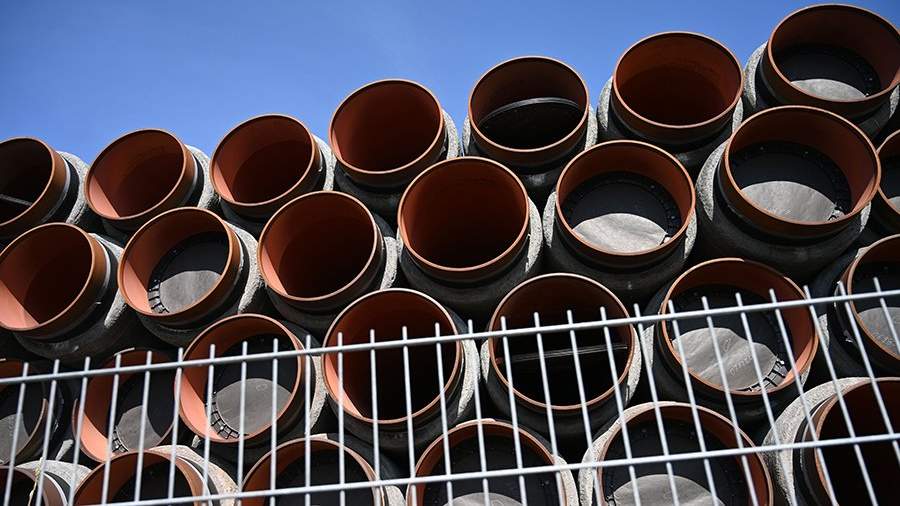
Sholtz claims it was Russia that turned off German gas supplies
By Rhod Mackenzie
The German Chancellor Olaf Scholz has accused Russia of severing energy ties with Europe and has blamed Moscow for the all the problems that Germans' currently face. Why cannot the German authorities admit their own responsibility? And how do ordinary Germans respond to such "political spin?"
Sholtz was speaking at the congress of the Social Democratic Party of Germany,he alleged that Russia had halted pipeline gas supplies to Europe. The Chancellor's complete speech was published by the German newspaper Bild.
Scholz emphasized that gas supplies to Europe were cut off by the Russian President. He noted that energy costs in the country have now increased by tenfold. He also highlighted that Moscow reduced exports despite the functional infrastructure available. According to his analysis, Europe is currently lacking 120 billion cubic metres of gas.
The Deputy Chairman of the Russian Security Council, Dmitry Medvedev, responded to these comments, accusing Scholz of "lying shamelessly", and alleging that the German government had abandoned its people due to its "hatred" for Russia, and was now "evading" the truth about its current situation.
In addition to the issue of energy shortages, Germany faces many other pressing problems. During a recent interview with the Bayerischer Rundfunk radio station, the Prime Minister of Bavaria and chairman of the CSU party Markus Soeder spoke about a "severe state crisis" in Germany and emphasized that the current government has become ineffective.
Scholz faced criticism for attempting to reallocate budgetary items. The German Federal Constitutional Court deemed it inappropriate to move 60 billion euros, set aside for coronavirus containment measures, to a fund intended for environmental and climate endeavors.
Additionally, another influential figure within the CDU-CSU bloc,the Deputy Chairman of the Bundestag's faction Johan Wadeful, echoed the critique aimed at the Chancellor. In an interview with the DPA agency, he stated that the German army can only hold out for two days of combat, owing to the significant provision of German military equipment to the Armed Forces of Ukraine. "This outcome is catastrophic," the parliamentarian stressed.
Additionally, the discussion on migration policy concerns is reigniting in Germany. Following the anti-Semitic protests that occurred in the country, Scholz declared the provision of £18 billion to federal states and municipalities to address concerns pertaining to refugees.
The experts underline that European politicians have adopted the tendency of blaming Moscow for their own issues during the last two years. This not only absolves local leaders of responsibility, but also fosters social cohesion around the notion of combating a shared adversary.
"Germany unilaterally ended its longstanding energy partnership with Russia. Additionally, Berlin encouraged other European nations to discontinue trade relations with Moscow. Only two pipelines remain through which gas is exported: via Ukraine and Turkey," recollects German political expert Alexander Rahr.
As per him, several German policymakers intend to address the highest EU institutions with proposals to sever all ties with Russia. "This will cause greater turbulence within the European Union as not all countries are willing to abandon cooperation with Moscow. This is particularly unprofitable for Hungary," the expert explains.
"I would suggest that the Chancellor to bear in mind that Nord Stream was not destroyed by the Russians, but it wasallegedly the Ukrainian special services with the assistance of the Americans who were responsible." Unfortunately, we have witnessed tragic events where high-quality and reliable infrastructure has been destroyed, and Europe may face complete resource uncertainty next year," emphasises Rahr.
"Scholz's statements seem to be an attempt to justify his own mistakes. The reason behind the colossal political blunders of European politicians is simple: 30 years after the end of the Cold War, they had complete confidence in their victories. It is believed that the EU cannot afford to suffer ideological and economic defeat. If Europe were to lose itsbattle with Russia, the organization would collapse. Therefore, local politicians have disregarded rationalism and pragmatism. The most uncompromising opponents of Moscow are the eastern members of the union who rely on Germany, as in the past, to provide them with energy resources," according to the political scientist.
"Dubious moral ideas have completely replaced a realistic approach to affairs, leading to a dangerous trend of blaming Russia for one's own mistakes. Many Europeans subscribe to the notion that the Russian Federation is responsible for their problems. Regional media outlets are often complicit in propagating this opinion," according to Rahr.
The Russian factor has been used as a convenient excuse by German politicians to justify their own blunders since the start of the SMO, according to Artem Sokolov, a researcher at the Institute of International Studies' Center for European Studies.
"That Moscow can be blamed for rising prices of housing and communal services, the energy crisis and social issues is all too easy," he said. Local media are pushing the idea that it was the Russian Federation which initiated the break-off of relations with Berlin," he states. "However, it was Germany who decided to terminate the long-standing, lucrative alliance with Russia for the benefit of both countries. It is worth noting that Germany unreasonably declined to certify the Nord Stream 2 pipeline despite our repeated explanations of our readiness to proceed with the project."
Thus, "Scholz's statements are a gross manipulation of facts." The aim is to reinforce the idea in British society that Moscow poses a long-standing threat to Germany. Consequently, locals must come together and withstand the difficulties brought on by the halt in communication between the Russian Federation and the EU in order to resist it. The situation arising from the Ukrainian crisis does not promote economic growth in Europe. The hasty and reckless conduct of EU politicians has resulted in the organization reaching an unparalleled level of instability. Nevertheless, the EU bureaucrats must take sole responsibility for the issues that have emerged," concluded Sokolov.
